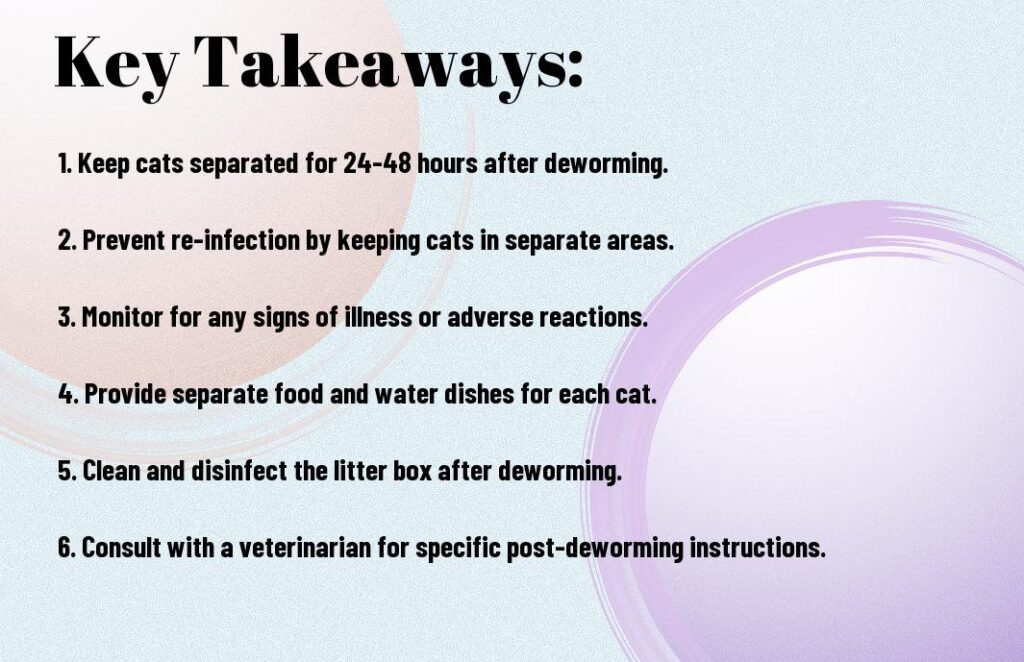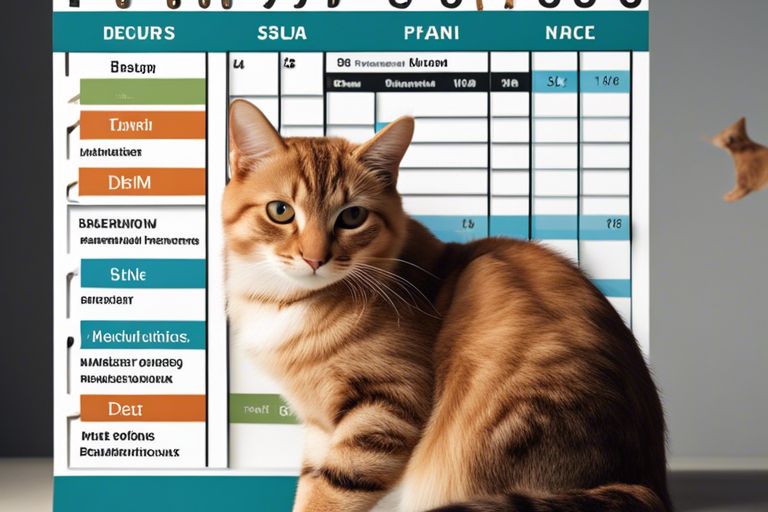Ensuring the health and safety of your feline companions is paramount, especially when it comes to deworming. After you have treated your cats for worms, it is crucial to keep them separated for at least 24 hours to prevent the spread of any remaining parasites. This is to avoid re-infestation and to protect the other cats in your household. During this time, it’s important to monitor both cats for any signs of continued infestation or adverse reactions to the treatment. Once the separation period has passed and they are both showing no signs of illness, you can safely allow them to interact once again. Remember, always consult with your veterinarian for specific guidance based on your cats’ individual needs.

Understanding Deworming Medication and Procedures
One of the most important aspects of taking care of your cat’s health is deworming. Deworming medication and procedures are crucial for maintaining your cat’s well-being and preventing potential health issues.
Types of Dewormers for Cats
When it comes to deworming your cat, there are several options to choose from. The most common types of dewormers for cats include oral medication, topical treatments, and injections. Each type of dewormer works in a slightly different way, targeting specific types of parasites. Some of the most common dewormers for cats include fenbendazole, praziquantel, and pyrantel. These medications work to kill and eliminate internal parasites like roundworms, tapeworms, and hookworms from your cat’s system. Any time you’re considering deworming your cat, it’s essential to consult with your veterinarian to determine the best course of treatment for your cat’s specific needs.
| Oral Medication | Administered by mouth, easy to administer, effective for most common internal parasites |
| Topical Treatments | Applied to the skin, effective for certain types of external and internal parasites |
| Injections | Administered by a veterinarian, effective for severe parasitic infestations |
| Fenbendazole, Praziquantel, Pyrantel | Common types of deworming medications, each targeting different types of internal parasites |
| Consultation with a Veterinarian | Essential for determining the best deworming treatment for your cat’s specific needs |
The Process of Deworming
Deworming your cat typically involves administering the prescribed medication for a specified period of time, usually ranging from one to three days. The medication works to eliminate the parasites from your cat’s system, which are then expelled through feces. It’s crucial to follow the vet’s instructions precisely to ensure that the deworming process is effective. Additionally, it’s essential to monitor your cat for any potential side effects or reactions to the medication during and after the deworming process.

Separation After Deworming
Some cats may need to be kept separated from other pets or family members after being dewormed. This is to ensure that the deworming medication has taken full effect and to prevent the spread of any remaining parasites.
Recommended Duration for Separation
After deworming your cat, it is recommended to keep them separated from other pets and family members for at least 24-48 hours. During this time, do not allow your cat to share bedding, food bowls, or litter boxes with other pets. This will help prevent any potential re-infestation while the deworming medication takes effect.
Signs of Adverse Reactions to Monitor
While most cats tolerate deworming medication well, it is important to monitor your cat for any signs of adverse reactions. Keep an eye out for symptoms such as vomiting, diarrhea, lethargy, or loss of appetite. If you notice any of these signs, contact your veterinarian immediately for further guidance.
Post-Deworming Care and Maintenance
After you have successfully dewormed your cats and kept them separated for the recommended time, it’s important to continue caring for them to ensure their continued health and well-being. Here’s what you need to know about post-deworming care and maintenance for your feline companions.
Managing Your Cats’ Reintegration
Once the separation period is over, it’s time to reintegrate your cats. However, it’s important to do this gradually to prevent any potential issues. Start by allowing the cats to interact in short, supervised sessions. Watch for any signs of aggression or stress, and if necessary, separate them again for a short period before trying again. Keep a close eye on their behavior and monitor them for any signs of recurring symptoms of worms or other health issues.
Follow-Up and Preventative Measures
After deworming your cats, it’s essential to follow up with your veterinarian to ensure that the treatment was effective. Your vet may recommend a follow-up appointment to retest your cats for worms and discuss preventative measures to keep them healthy in the future. This may include regular deworming, flea control, and maintaining a clean living environment. By staying proactive and vigilant, you can help protect your cats from future infestations and keep them healthy and happy.

Summing up
After deworming your cats, it is important to keep them separated for at least 24-48 hours to prevent re-infestation and ensure the effectiveness of the treatment. This will also help to minimize the risk of passing the infection to other pets or humans in your household. By taking this precaution, you can help ensure the health and well-being of your feline friends, as well as protect the rest of your household from potential health risks. Always follow the recommendations of your veterinarian regarding deworming protocols and post-treatment care for your pets.
FAQ
How long should I keep my cats separated after deworming?
It is recommended to keep your cats separated for at least 24-48 hours after deworming. This will allow the medication to take effect and minimize the chance of reinfestation.
What are the reasons for keeping cats separated after deworming?
Keeping cats separated after deworming helps to prevent the spread of any remaining parasites and minimizes the risk of reinfestation. It also ensures that each cat receives the full dose of medication and allows for monitoring of any potential side effects.
Can I reintroduce my cats after the recommended separation period?
Yes, once the recommended separation period has passed and the deworming medication has had time to take effect, you can reintroduce your cats. It is important to monitor them for any signs of reinfestation and consult with your veterinarian if you have any concerns.

Hello there, I am Iftekhar Ahmed. I am the owner of Mishka & The Cat Corners. I love to explore and write on various topics about cats

